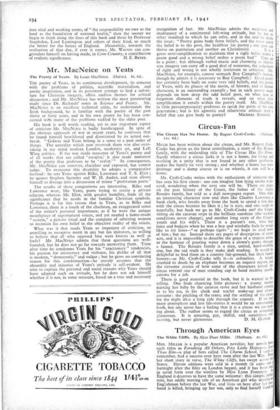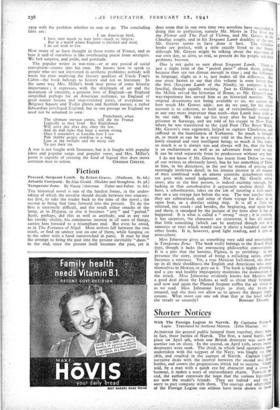Through American Eyes
MRS. MILLER is a popular American novelist; her novels hay' such titles as Forsaking AU Others, Five Little Heiresses, Le' Than Kin—a play of hers called The Charm School, I seem remember, had a success over here soon after the last War. No" her short story in verse, The White Cliffs, has swept across N States. Eleven editions were sold in a month (it came out I fortnight after the blitz on London began), and it has been gal in serial form over the wireless by Miss Lynn Fontanne. England it deserves to have the same welcome: this simple, rather trite, but oddly moving tale of an American girl who marries Englishman before the last War, and lives on here after her bi band is killed, bringing up her son, only to find herself faced
1939 with the problem whether to stay or go. The concluding lines are :
I am American bred,
I have seen much to hate here—much to forgive, But in a world where England is finished and dead,
I do not wish to live.
How many of us have thought in those terms of France, and to hear it said of ourselves is like overhearing praise from strangers. We feel surprise, and pride, and gratitude.
The popular writer in war-time—or at any period of social convulsion—Comes into his own. He knows how to speak to people who are not interested in aesthetic problems; nobody will waste his time analysing the literary qualities of Uncle Tom's Cabin—the book belongs to history and not to literature. In the same way Mrs. Miller's book may prove of some historic importance ; it expresses, with the minimum of art and the maximum of sincerity, a genuine love of England—an England simplified perhaps for an American audience, an England of great manor houses and impoverished peers, of receptions in Belgrave Square and Tudor ghosts and Scottish nurses, a rather Edwardian privileged England, but in one passage an England we need not be ashamed to own: Frenchmen, when The ultimate menace comes, will die for France Logically as they lived. But Englishmen Will serve day after day, obey the law, And do dull tasks that keep a nation strong.
Once I remember in London how I saw
Pale shabby people standing in a long Line in the twilight and the misty rain To pay their tax
A war is not fought with literature, but it is fought with popular jokes and popular songs and popular verse, and Mrs. Miller's poem is capable of creating the kind of legend that does move



























 Previous page
Previous page